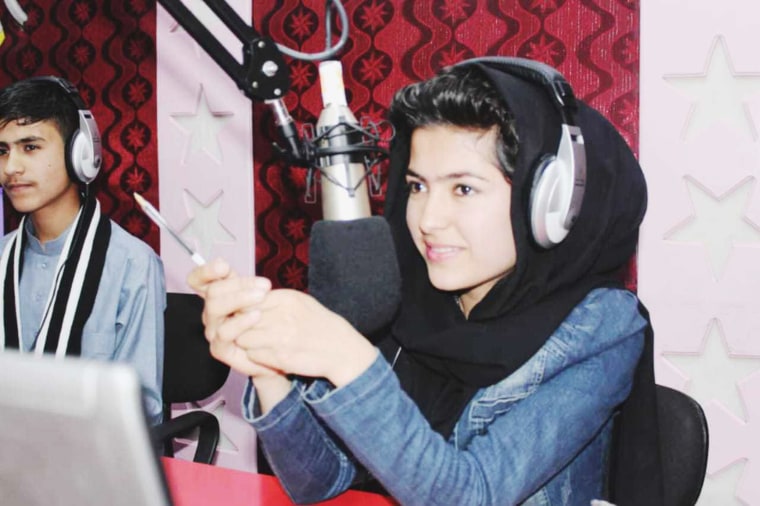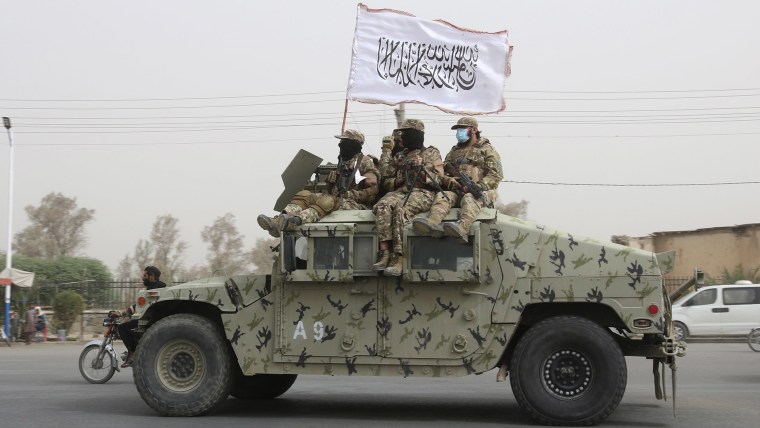Lida Khurami thought there was little remarkable about her life — until two years ago when it was ripped apart.
“We did not have a special life, but it was a good life. We were happy,” Khurami, a journalist, said. “We had a place where we could sleep at night without fear or nightmares, next to the family.”
Ever since the Taliban takeover of Afghanistan on Aug. 15, 2021, most of the fighting that had engulfed the country for decades has ended, but so has the life Khurami built. She no longer can work alongside colleagues, play volleyball in the park or pick up her sisters from school.
Khurami, 24, was part of a generation that grew up after the first Taliban government fell in 2001, toppled by U.S.-backed forces after having sheltered the mastermind of the 9/11 attacks. She benefitted from billions in aid from the West aimed specifically at bettering the lives of Afghanistan’s women and girls. But the return of the austere and hard-line militants has stripped almost everything from Khuramni — her family, career and livelihood — and now, having fled her homeland, she is struggling to find enough to eat in neighboring Iran while trying to gain asylum in Europe.
The sole breadwinner of a family of eight, Khurami was a radio and television journalist and wanted to get a master’s degree in international relations. When the Taliban overthrew the U.S.-allied government of President Ashraf Ghani, like millions of women she was stripped of her rights.
The oldest of her five siblings, Khurami grew up in Samangan in northern Afghanistan with three brothers, aged 10, 13 and 16, and two sisters, a law student aged 18 and an engineering student aged 22 — both of whom can’t continue their education because of the bans imposed by the Taliban.
“Everyone’s dreams were destroyed,” she said via WhatsApp calls and messages from outside of Tehran. “My sisters were talented girls. [Our] parents, despite having a hard life, always tried to make us study.”
Today’s Afghanistan is the most repressive country in the world for women, who aren’t allowed to be educated beyond the sixth grade. Work outside the home is severely restricted, and women aren’t allowed to appear in public without a male escort.
The regime has imposed the “most comprehensive, systematic, and unparalleled assault on the rights of women and girls,” the U.N. women’s agency said in a statement Tuesday.
The Taliban say their restrictions are temporary, allegedly because women were not wearing the Islamic headscarf, or hijab. Nevertheless, the economy is in shambles and the regime has drawn near universal condemnation, even by its neighbors like Iran, threatening the much needed humanitarian aid.
“The idea is that women are the property of men. They should be mothers and wives, but only in the sense of companions and not a partner,” said Payvand Seyedali, founder and executive director of The Khadijah Project, an initiative that supports the protection of women and girls in Afghanistan.
Even before the Taliban overran Kabul two years ago this month, triggering a chaotic exodus of terrified Afghans, life was difficult for many. Despite laws that enshrined the rights of women and girls, maternal mortality was among the highest in the world, and millions married as children and did not have the opportunity to pursue an education.

At the age of just 15 and full of passion to tell the stories of women, Khurami started presenting children’s radio programs in Samangan.
“I wanted to be the voice of girls who have problems and cannot raise their voice,” she said.
When she was about to graduate from high school in 2015, she began working for local radio and TV stations.
Khurami says she faced obstacles even before the fall of the government in Kabul, with family members pressuring her and her sisters to abandon their education and career plans and get married. Her work drew anger from some, who called her an “infidel” just for choosing to become a journalist — viewed as a dangerously permissive profession that allows gender mixing, which is frowned on by many in the ultra-conservative society.
Still, she persevered, buoyed by her parents and sibling and a small but growing presence in Afghan society that sought to loosen the restrictions on the behavior of women.
“Believe me, I went through a lot of bad situations,” she said. “I was under pressure from all sides.”
Before they took Kabul in August 2021, the Taliban had worked their way across a country worn down by an ineffective and corrupt central government. They captured cities and regions eager for peace at any cost and intimidated by the fighters’ brutality. As they progressed, the Taliban dropped hints that they had moderated their approach toward women.
Source: | This article originally belongs to Nbcnews.com











